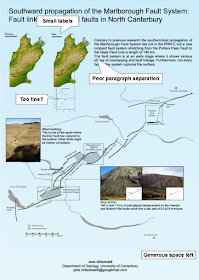This week, we have a lovely geology poster submitted for review from Jana Mittelstädt.
This poster is successful because it only tries to do one thing: present a case for a new hypothesis to explain a geological feature. And it makes its case through one large, detailed graphic.
My only suggestions for improvement would be a few minor changes at the top of the poster. That there is ample blank space at the bottom of the poster means that some of the material at the top could be enlarged without crowding the rest.
The labels, “Previous interpretation” and “New hypothesis” are far smaller than their importance warrants. People are going to look in that upper left corner first, and by enlarging the labels above the green maps, you would let them known in an instant the case that you are trying to make on this poster.
Similarly, the callout under the second map seems a little too understated, although it might be more legible on the printed poster.
Finally, the text in the upper right is large enough, but would benefit from some paragraph indents and half a line, or line, of space to separate the text.
If you have a poster you’re proud of, email me! I’m particularly interested in posters from sciences besides my own (biology), and academic disciplines besides science.



Hi Zen! I agree, this is a great poster, overall. You can feel free to use my poster that I sent you back in Oct. for a critique, if you wish.
ReplyDeleteI could be wrong, but I don't believe that the humanities (English, history, etc.) use posters to communicate their research. I'm not sure about the other social sciences, but it would probably be easy enough to find out by looking up the website of the major conference in their field, and seeing if there are poster sessions.
Humanities have embraced poster sessions in the last 10 years. Embraced might be too strong...but within meeting organizer circles, they are trying to push the medium. I've yet to attend a session of the sort to see how it goes. Always wonder whether they read their posters verbatim just like they tend to publicly read their papers at formal talks.
ReplyDelete